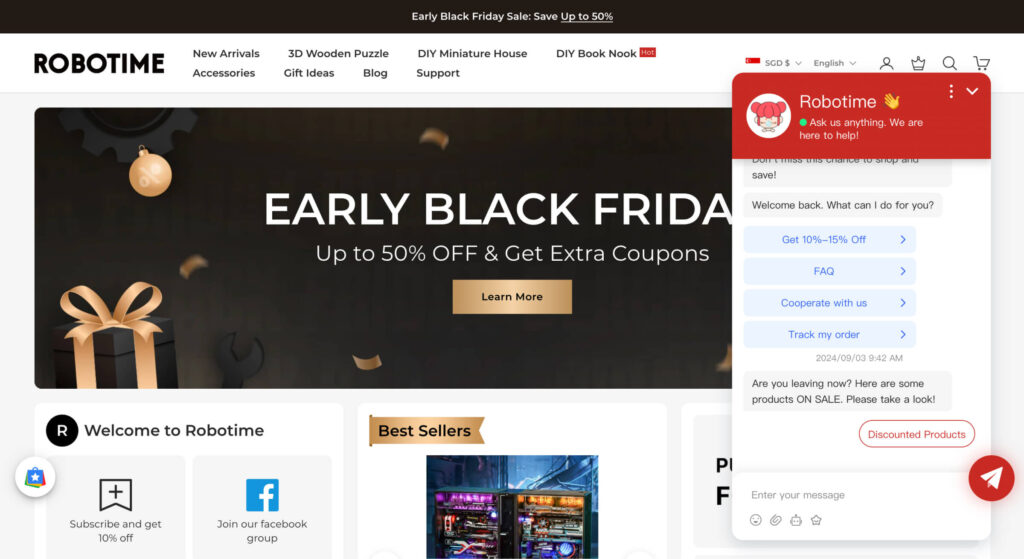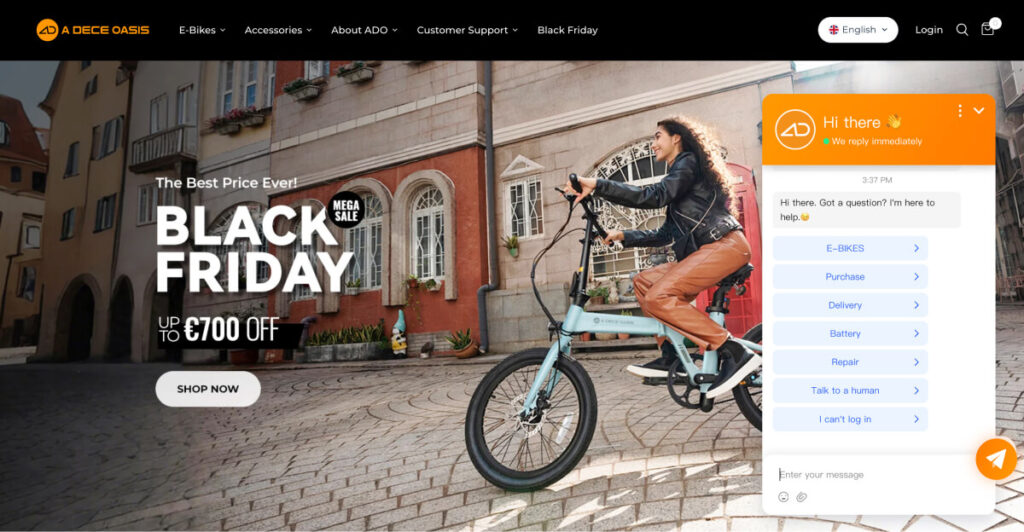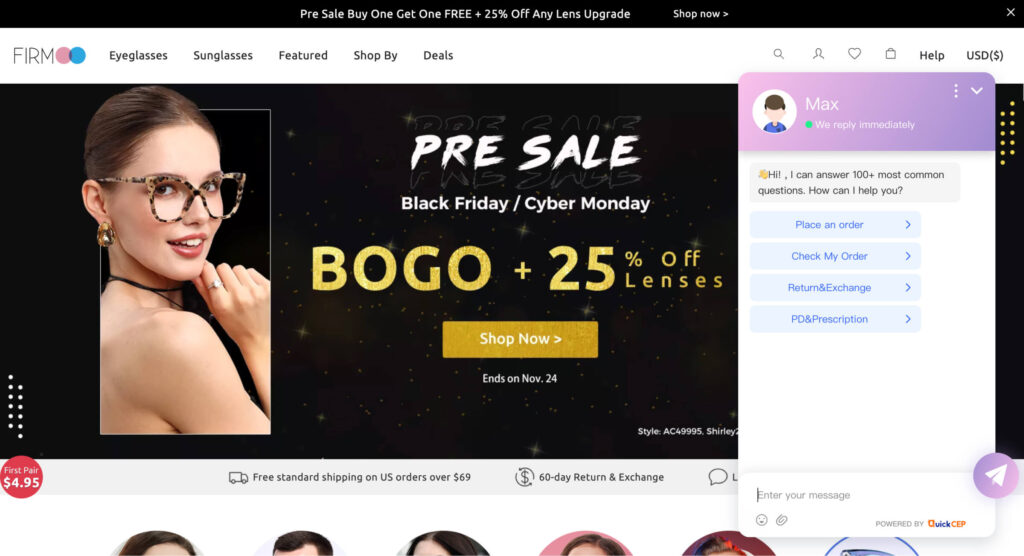Chatbot marketing provides businesses a way to improve and streamline their customer service processes. It is a channel you can utilize to promote products and services using pre-set scenarios or artificial intelligence (AI) implementation.
Chatbot marketing aims to increase customer engagement and reduce friction in the customer journey–from acquisition to retention. Ultimately, the goal is to improve the overall customer experience.
In this guide, learn about chatbot marketing 101—what is chatbot marketing and why you need it. Keep reading to explore how you can maximize using chatbots to improve customer care and grow your business.
What Is Chatbot Marketing?
Chatbot marketing is a customer engagement strategy that utilizes conversational AI to simulate human interaction on messaging platforms, websites, and mobile apps.
It leverages natural language processing (NLP) to understand user queries, answer questions, provide personalized product recommendations, automate tasks, and ultimately drive sales and brand loyalty.
Chatbot marketing aims to enhance customer experience by offering 24/7 availability, convenience, and a conversational approach to brand interactions.
What Are Chatbots?
Imagine a helpful assistant, always available to answer your questions, guide you through a purchase, or simply chat. That’s the essence of a chatbot. In simpler terms, a chatbot is a computer program that simulates a conversation with human users.
Chatbots utilize various technologies, including:
Natural Language Processing (NLP): This allows chatbots to understand the intent behind user queries, even if phrased differently.
Machine Learning: Through user interactions, chatbots continuously learn and improve their ability to respond accurately.
Decision Trees: These act as a roadmap, dictating the chatbot’s responses based on user input.
How Do Chatbots Help Your Business?
Chatbots can instantly respond to customer queries so you can provide customer support 24/7. The data you collect would help understand customer pain points and trends. You can use them to offer a better, more personalized customer experience.
Here’s how chatbots can help you engage and interact with your customers:
- Sharing quick messages about the newest deals, discounts, products, or services of your brand.
- Addressing and resolving a complaint or issue.
- Giving a more thorough response to an inquiry.
- Connecting with the appropriate support team for a given issue.
Benefits of Chatbot Marketing
Integrating chatbots in your marketing plans brings about several advantages.
They offer 24/7 customer care service, which guarantees quick reactions to questions and problems.
Chatbots offer customized responses depending on individual preferences and actions, which helps in building higher relationships with customers.
Chatbots support scalable communication making it possible for businesses to interact with many users at the same time without losing the quality.
In general, marketing chatbots promote productivity, refine user experience, and ensure the success of online marketing campaigns.
Why Your Business Needs Chatbot Marketing
1. Enhanced Customer Experience
Customers want prompt and custom answers and solutions for their questions and problems. Chatbots can do this or such kind of customer service, responding immediately to inquiries around the clock. They can also customize interactions through the use of customer data to offer individualized solutions, thus, ensuring that customers feel appreciated and contented.
2. Increased Engagement Rates
Chatbots are crafted for customer engagement in conversational form, therefore, the interaction becomes fun and interactive. This brings about increased engagement rates and therefore, can produce higher conversion rates.
3. Improved Lead Generation
Chatbots are used as lead generation tools where they collect related customer information and qualify leads through chats. This gives high-quality leads but also saves the time and effort of businesses and their teams.
4. Cost-Effectiveness and Efficiency
Integrating chatbots may help companies save time and money because they can deal with common inquiries quickly and in this way release human resources to more difficult tasks. Additionally, chatbots are capable of dealing with several inquiries at once, so there is no waiting time for unbefitting responses.
Key Strategies For Implementing Chatbot In Marketing
Identify Goals
It is critical to establish what you want to attain before launching a chatbot strategy. This can be enhancing customer experience, improving engagement rates, or making customer support more efficient.
Select a Platform
Several chatbot platforms offer diverse features and capabilities. The choice of a platform should be made based on the goals of the organization and business requirements.
Design User Experiences
The key to good chatbot interactions is creating user experiences that are interesting and intuitive. This requires that you understand who your target audience is, what they want, and how they want it, and then design conversations that cater to these factors.
Personalization and Natural Language Processing
Personalizing and natural language processing (NLP) are important for developing enjoyable chatbot interactions. With NLP chatbots can comprehend and answer in natural human language leading to more seamless and efficient conversation.
Integrate with Existing Marketing Channels
To come up with a seamless customer journey, it is important to combine marketing chatbots with other marketing channels. Examples of such are social media, email marketing, or other digital channels.
Overcoming Challenges In Chatbot Strategy
Chatbot strategy presumes businesses to manage the quality of conversations and meet customer expectations.
The evolution of language and customer interactions can make it difficult to maintain conversational quality. In addition, customer expectations control is very important to help them not to be disappointed and frustrated.
To deal with these issues, chatbots need to be continually trained using AI and machine learning. With the help of these technologies, chatbots will be able to recognize the switching language patterns and customer preferences and maintain a high conversational quality. Defining the limits of the chatbot’s functionality is important. A well-written list of chatbot tasks specifies what the chatbot can do for the customer. So the customer to get the best from the chatbot and, at the same time, avoid disappointment.
The chatbot’s knowledge base and algorithms should be updated according to the real-time interactions for the responses to be relevant and accurate. Also, human moderation incorporation leads to the prompt resolution of tricky issues that lie beyond the chatbot’s reach, thus maintaining uninterrupted customer service.
With a focus on continuous learning and clear boundaries businesses can overcome the challenges of marketing chatbots and in the process deliver delightful customer experiences and sustainable growth.
Measuring the Success of Your Chatbot Marketing Efforts
As with any other marketing tactic, measuring and monitoring the success of chatbot strategy attempts is critical. Here are some key metrics and analytics to consider:
Engagement Rates
The volume of customer interaction with chatbots is a measure of this metric. Tracking engagement levels is important for evaluating the performance of chatbots and for monitoring feedback from customers about the usefulness of the chatbots.
Conversion Rates
Conversion rates quantify the number of leads that become customers. Conversion rates of leads generated by chatbots can also be tracked to understand the effect of chatbot strategy on the bottom line of businesses.
Customer Satisfaction Scores
Customer satisfaction is key to the success of any business. marketing chatbots also can improve customer satisfaction by delivering fast and personalized help. It is vital to follow customer satisfaction scores to know the performance of chatbots and make the necessary improvements.
Explore Chatbot Marketing Today
Marketing automation of chatbots revolutionizes enterprises that are eager to increase customer involvement, standardize operations, and improve sales. With the dynamics changing, chatbots are evolving into a necessary tool for companies to remain competitive and responsive to what their customers expect.
QuickCEP is leading in chatbot technology, revolutionizing the manner companies have a discourse with their clients. QuickCEP is revolutionizing customer service and creating feasible marketing solutions with its AI-managed and personalized processes. Be part of QuickCEP today and transform the way you engage your customers!



